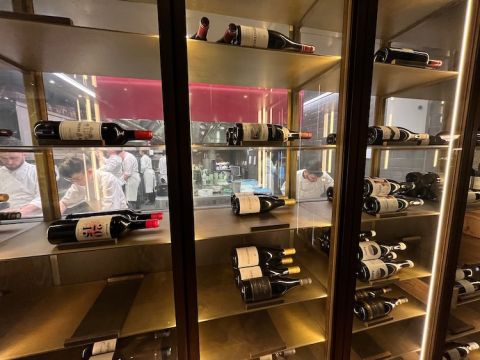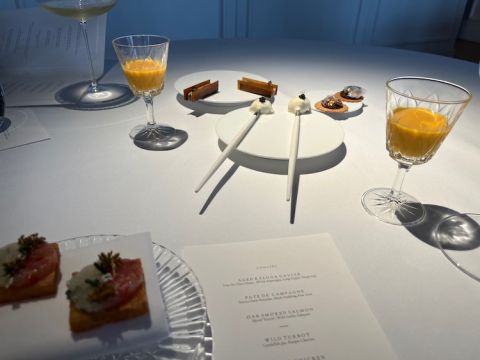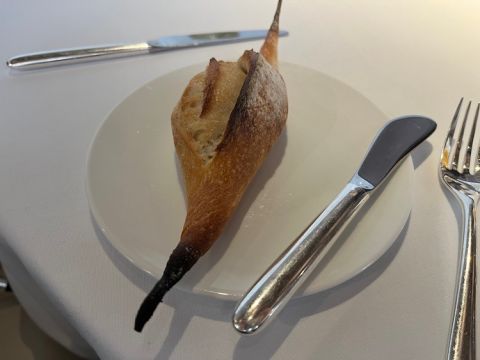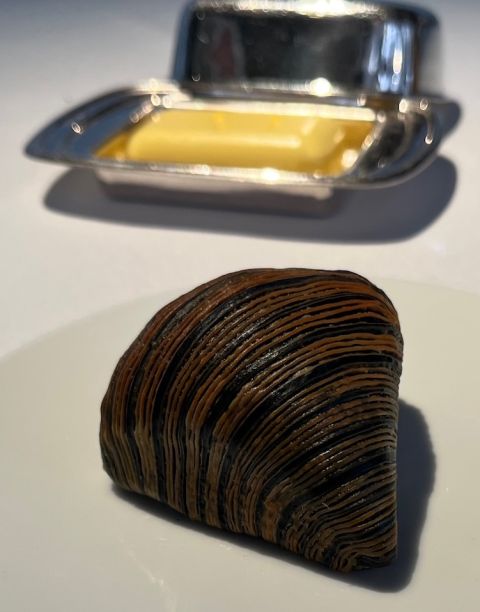25 July Jancis adds It seems that soon after this article was published, this small, 11-table restaurant was overwhelmed by bookings from solo diners – so much so that, as reported rather confusingly in The Caterer, from mid August, solo diners will be charged double unless they are able to secure a table only 24 to 48 hours ahead. It is clearly a struggle to make the numbers add up here. Corkage is apparently £100 a bottle.
3 June 2023 London's Café Royal has been rejuvenated for lovers of haute cuisine.
I hadn’t heard of Alex Dilling until last week. He is the man who has, deservedly, been awarded two Michelin stars for his restaurant tucked away on the first floor of the Hotel Café Royal by Piccadilly Circus in London which opened in September 2022. Behind this ‘instant success’ lie 20 years of cooking and learning his craft in some of the world’s top kitchens.
His aim is to produce modern French food, with an extra emphasis on the quality of the ingredients, accentuated by the very best culinary techniques. His location is slightly hidden, if clearly signposted, in a room overlooking Regent Street that is soundproofed, light and airy. His dining room can seat a maximum of 34, in great comfort.
The ultra-modern kitchen, clearly visible despite all the wine bottles stored in front of it, is obviously ambitious. Dilling no longer has to cook the all-day menu available to customers in the brasserie next door, as was the case for his predecessor Laurent Tourondel, so he and his brigade can really concentrate on their haute cuisine.
One enters the elegant, inviting dining room through a dark bar and past another lacklustre bar area. There is little clutter on the white tablecloths, no art on the walls and the only floral arrangements are of the dried variety in the centre of the room. There is, however, a smiling Benoît Massonneau to greet you.
Massonneau, born in Brittany but who quickly admitted ‘my kids are English’, has worked with Dilling in the past and their joint experience is obvious. Portly, but with his jacket invariably buttoned up, he patrols the corridor that leads from the bar to the restaurant and then into the kitchen with authority. His manner conveys the feeling that there is nothing for the customer to worry about: everything has been thought through.
We were shown the menu – £85 for three courses – and quickly made our choices. A few dishes were out: the caviar at an extra £35 and the wagyu beef at an extra £75, and I pointed out to my guest that the oak-smoked salmon would really be no test of a kitchen. We both ordered the same two dishes – the pâté de campagne boasting Ibérico pork shoulder, black pudding and foie gras, and then the wild turbot with cuttlefish jus and Basque chorizo.
And so to their wine list. My guest is a white burgundy lover but I thought a little experimentation was in order, and my eye was caught by a half-bottle of Cervaro della Sala, Antinori’s Central Italian answer to white burgundy. Its ambitious price also caught my eye: £105 a half. But it was worth every penny: sunny, appetising at the outset and yet full of flavour. My initial impression of the wine list was that it is expensive – but when I checked the wine list of Cantinetta Antinori, which has just opened in Knightsbridge, I was less certain. A bottle of the 2019 Cervaro on the Cantinetta wine list is £195. Expensive it may be, but Alex Dilling’s list is comprehensive and does include four examples of 1961 red bordeaux.
No sooner had another smartly dressed waiter appeared brandishing our half-bottle than two others appeared carrying the five very different amuse-bouches which Dilling considers are the appropriate way to start a meal. These were: a tiny Jersey Royal potato covered in a smoked eel cream topped with caviar; a duck rillette sandwich; a slice of pissaladière; their version of a bouillabaisse; and a thin pastry topped with slices of red prawn. All were delicious and intricate and revealed the kitchen’s competence and generosity.
These traits were reinforced by the bread on offer which included baguettes with the crispest points ever (my favourite part!) and by our first courses of the pâté, expertly cut into three squares and enveloped by a sticky brown sauce. This was excellent but it was outshone by the charcoal bun that accompanied it and, despite the baguette, was promptly devoured.
The turbot that followed was a dish that seemed the epitome of Dilling’s approach to cooking today. Two tranches of turbot had been decorated with an ornate black lattice. The tranches had been steamed before being placed on a thick black sauce made from cuttlefish. Alongside this was a bowl of potato puree and a green salad in which stalks of fresh and cooked asparagus played a prominent part.
Dessert came in three parts. First was the ‘avant dessert’ which involved my favourite gariguette strawberries, a light lemon mousse covered by a jelly and sorbet made from this delightful fruit; then a rich mix of Taïnori chocolate from the Dominican Republic; and finally another barrage of petits fours that comprised two plates and finally signalled our defeat. With a couple of coffees, of Peruvian origin as noted on my bill, I paid £338.68 including 15% service, for the pleasure.
Dilling and various other members of his brigade had appeared over lunch, pouring sauces and scooping ice creams so I had some idea of the man I arranged to meet a couple of days after our lunch. Still with a strong American accent – he moved to the US as a boy and spent his first five years cooking there – he mentioned the immediate effect of Michelin recognition. ‘We received the two stars after being open for six months. It was the most enormous pat on the back for my brigade because the first six months in any kitchen are invariably the hardest. And it has done me no harm in my relationship with the hotel’, he added.
This seems a justified reward for a man who at the age of 39 decided to hang his name on his front door for the first time. Dilling originally worked for five years at Alain Ducasse’s restaurant Adour in the St Regis hotel in New York where he learned ‘the proper way to cook’. While in the city he discovered his own way of relaxing: ‘sitting at the counter in every hotel restaurant in the city’. From there he moved to Caviar Russe in New York where he won a Michelin star before being head-hunted to London to work alongside Hélène Darroze at The Connaught Hotel where he rose to the position of executive corporate chef. From there he was poached by Marlon Abela, who had a talent for finding the best chefs, to run The Greenhouse where he retained its two Michelin stars before Abela’s restaurant business imploded.
COVID proved difficult, forcing chefs not to cook for two years, as Dilling explained, but he managed to survive by satisfying the needs of the rich as a hired chef and enjoyed a happy stint in Malta before a return to London and the offer from the Hotel Café Royal. Dilling’s relationship with the hotel is as a tenant. ‘We pay our rent monthly and on time’, he told me with his trademark smile. And he has his team alongside him, in particular Pierre Minotti, whom he first met at The Connaught, as his head chef. Filling the 12 positions in the kitchen is Dilling’s biggest challenge but gradually this is happening. Until then, the restaurant will open for lunch only Thursday to Saturday and for dinner Tuesday to Saturday.
Before opening at the Café Royal, Dilling had offers from the Four Seasons and the Lanesborough hotels in London as well as the Ritz in Paris. I believe he has made the right decision and his restaurant is an excellent addition to what is on offer in central London.
Restaurant Alex Dilling at Hotel Café Royal 68 Regent St, London W1B 4DY; tel: +44 (0)20 7459 4022






